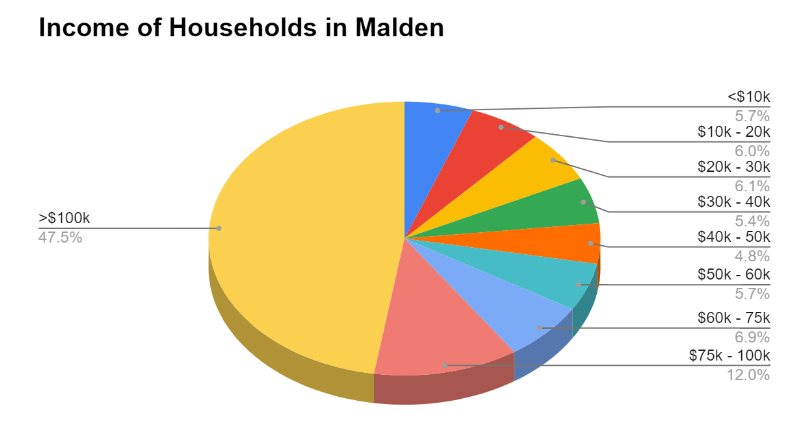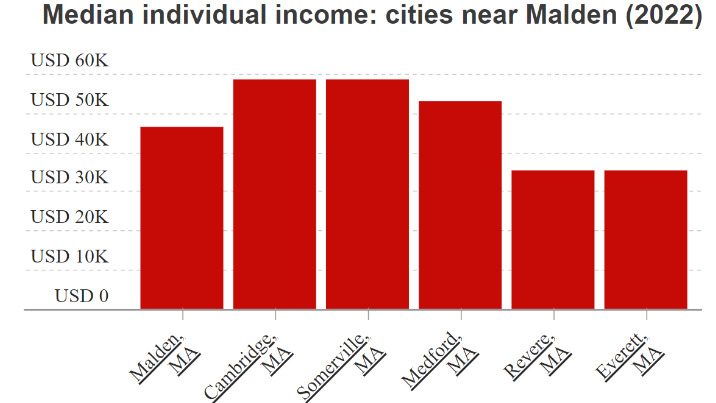
Graph depicting the average household income in Malden based on the City of Malden's reported data via cityofmalden.org. MACK KEATING
For several years, Malden High has offered a program called “Get AHEAD Day,” which is scheduled for students to have broader opportunities. “AHEAD” stands for A Higher Education Access Day.
Seniors received emails in early September asking to enroll for the SAT that day. In years prior, every senior took the SAT on Get AHEAD Day; this year, there were limited spots that had to be selected by September 8th.
While the test remained free, this was not immediately known to some. When enrollment spots opened, it was with the asterisk that they may have to pay for their spot.
Malden is an exceptionally diverse community, and this extends into familial economics. At a median income of $46,391, according to a 2022 census, Malden trails surrounding sounds such as Medford, Melrose, Cambridge, and Somerville, with a small lead over Revere and Everett.


While many low-income families receive fee waivers for the SAT, this is often capped at three per student. If students have already used their fee waivers, they may not have the luxury of affording another $68 test. The updated cost was officially announced during Morning Meeting two days before the deadline and that detail was not included in reminders for seniors to sign up, nor was it in future Morning Meeting announcements.

However, there were still spots to sign up until October 15th, the day before the exam. Jenkins House Guidance Counselor Ann O’Connor emphasized that anyone who missed the cutoff could still “reach out to their counselor because we ordered a few extra SATs.” The official deadline of September 8th was removed ex post facto to ensure as many students as possible could sign up.
The school needed to know in advance if students would like to participate, as students must be registered on BlueBook, the CollegeBoard’s test host, before the exam. “We can’t just have someone show up last minute and hand them a test, there needs to be preparation on both sides,” O’Connor explained.
Seniors who were not interested in taking the SAT on Get AHEAD Day were given the option between touring Bunker Hill Community College (BHCC) or doing post-high school planning in the library, ranging from “financial planning” to “college searches, career searches, college application help, anything they need to be successful after they graduate,” O’Connor emphasized.
Seniors are not the only students with Get AHEAD Day: every grade participates.
Juniors and sophomores have the opportunity annually to take a practice SAT, or PSAT, during that time. While their scores will not have the same weight as an SAT, it is a good predictor of their scores when they take the SAT. Costing $18 rather than the $68 of the SAT, Malden High has been able to continue funding this for the two grades. Unlike the SAT, the PSAT remained required for students and did not have a sign-up beforehand.
Freshmen participate in the Freshmen Olympics, an opportunity for students to meet a wider variety of classmates and participate in non-academic activities. Last year’s event included designing and decorating posters, trivia, tug of war, basketball free throws, and push-ups.

With Dr. Timothy Sippel taking on the role of Malden Public Schools’ Superintendent, one issue the district has faced in previous years is the concept of Structured Learning Time. The Department of Early and Secondary Education (DESE) of Massachusetts dictates that all secondary school students are “scheduled to receive a minimum of 990 hours per school year,” DESE’s official regulation site states. This is further clarified: “Time which a student spends at school breakfast and lunch, passing between classes, in homeroom, at recess, in non-directed study periods, receiving school services, and participating in optional school programs shall not count toward meeting the minimum structured learning time requirement for that student.”
This requirement has been the basis for several schedule changes in the past few years, especially regarding Flex Block. O’Connor clarified that because this school day was still required for students to attend, special school days such as Get AHEAD Day still count towards this learning time. Some misunderstandings in this policy can lead to “a very narrow idea of what would count as educational learning time,” O’Connor commented. “It’s important to think about the student as a whole: whether social, emotional, college and career planning, these are all things that have value, and there needs to be time during the school year that is focused on addressing these needs.”
Sippel testified that “public education can make the difference for children in terms of whether they have opportunities after high school,” clarifying that an overall goal for Malden’s administration is to ensure students “are prepared to have as many options as they can possibly have” post-high school.
Although funding for next year’s Get AHEAD Day is still uncertain, students will still have opportunities to prepare for post-graduation, including college-planning activities during school.




